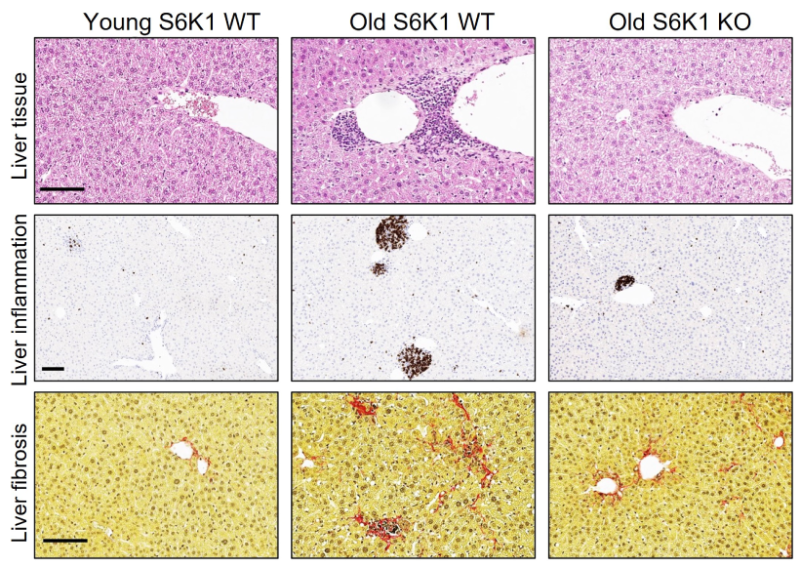Researchers at the MRC Laboratory of Medical Sciences (LMS) have shown that blocking the longevity gene S6 kinase 1 (S6K1) extends lifespan by reducing inflammation, and not by directly influencing a dormant cellular state known as senescence. The findings deepen our understanding of the pathways involved in ageing and age-related diseases and could lead to new treatment strategies and interventions.
By LMS Staff Member
August 29, 2024
Time to read: 4 minutes

S6K1 is a protein involved in the regulation of ageing and age-related diseases. Blocking this protein in mice makes them live longer and mimics the health benefits of reducing calorie intake, such as reduced body fat, stronger bones and resistance to diabetes, though the underlying mechanisms were not previously understood.
S6K1 is a key target of the mTOR signalling pathway, which regulates growth and metabolism in response to nutrients and stress. The pathway also influences cellular senescence. As we age, senescent cells accumulate and release of high levels of inflammatory proteins – a phenomenon known as the senescence-associated secretory phenotype (SASP).
Elucidating the relationship between S6K1, senescence and the SASP will advance our understanding of ageing and holds potential for treating age-related diseases.
In research published today in Nature Aging, scientists at the LMS and the University of Tübingen have shown that deleting the S6K1 gene in aged mouse livers reduces inflammation by suppressing the production of inflammatory proteins released as part of the SASP, rather than by affecting senescence, as originally hypothesised by the research teams. Excitingly, this work now provides a biological mechanism for the beneficial effects of removing S6K1 upon ageing and health span in mice first demonstrated by Professor Dominic Withers, Head of the Metabolic Signalling Group and published in Science in 2009.
While initially surprising, the findings corroborate those of other studies published this year, building an emerging picture of the interrelated role that inflammation, metabolism and senescence play in ageing and disease – all of which are strategic areas of research focus for the LMS.
This includes complementary work in fruit flies showing that the S6K protein controls inflammation, a study showing that simulating an excess of nutrients in mice increased inflammation and shortened lifespan, as well as work from Professor Stuart Cook, Head of the Cardiovascular Disease Mechanisms Group at the LMS showing that inhibiting an inflammatory protein, IL-11, led to health benefits and increased lifespan.
Now that the principles of S6K1 deletion have been established in liver tissue, the team plans to carry out follow-up studies to determine whether the same thing is happening in other tissues in the body.
While inflammation plays an important role in helping your body respond to injury and infection, it is a significant driver of ageing and many diseases. Enriching our knowledge of how inflammation contributes to ageing and disease opens up avenues for developing new strategies to treat ageing and age-related diseases.
Professor Withers, senior author, commented: “This work was a tour de force exploring the physiological, cellular and molecular mechanisms that underlie the long-lived phenotype in mice lacking S6K1. It is becoming increasingly clear than inflammatory processes are a key component of age-related diseases and there is great potential for interventions that could modulate this process.”
Professor Jesús Gil, Head of the Senescence Group and senior author commented: “Enhancing our understanding of the interaction between metabolism, senescence and inflammation is a key first step to designing rational synergistic therapies that could be used to treat diseases of ageing.”
This work was led by Dr Suchira Gallage, a former PhD student at the LMS, under the supervision of Professor Withers and Professor Gil, and in collaboration with Professor Mathias Heikenwälder at the University of Tübingen, where Dr Gallage is now a group leader.
The full paper can be accessed here: Gallage, S., Irvine, E.E., Barragan Avila, J.E. et al. Ribosomal S6 kinase 1 regulates inflammaging via the senescence secretome. Nat Aging (2024). https://doi.org/10.1038/s43587-024-00695-z